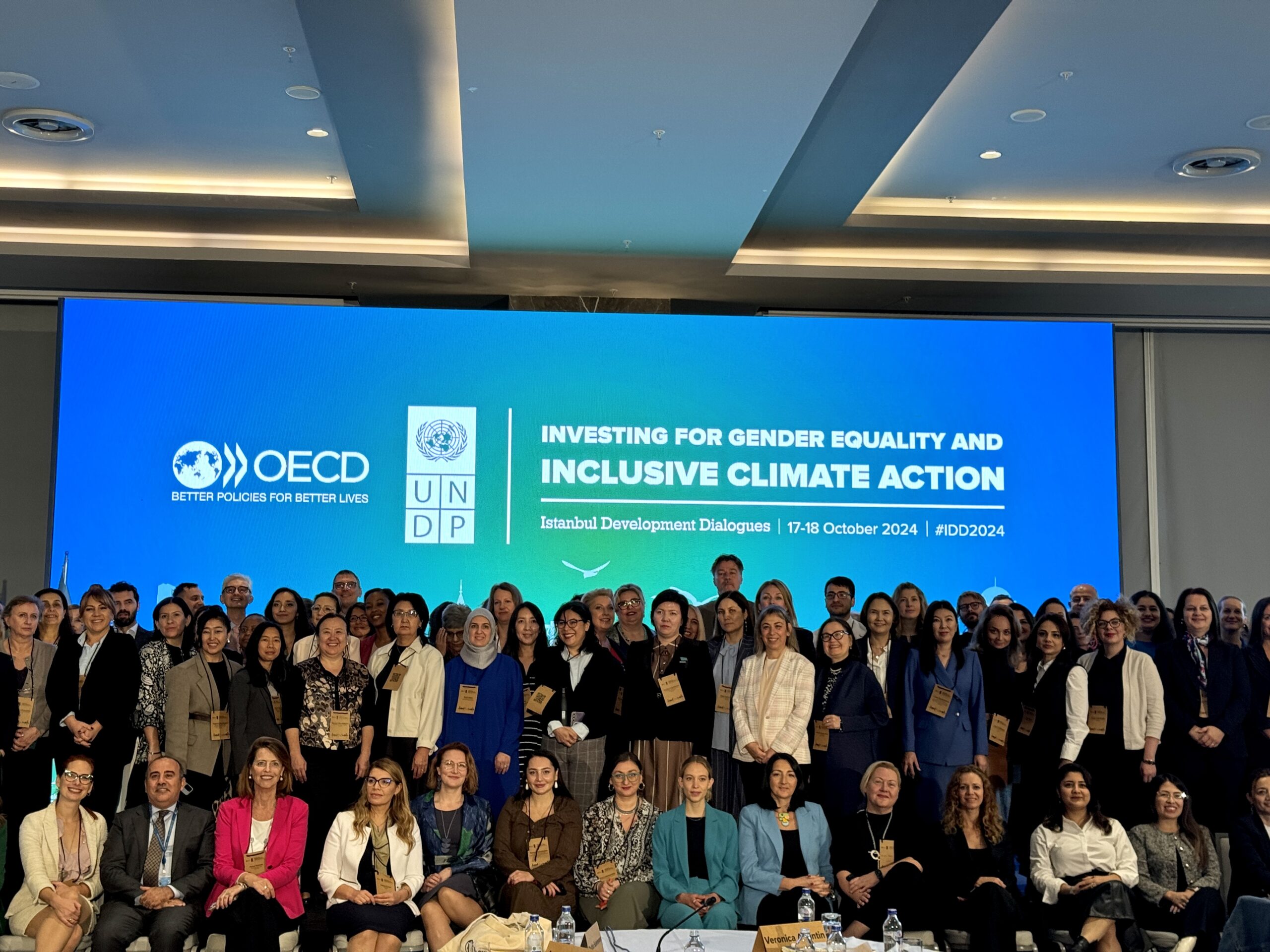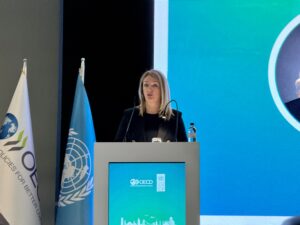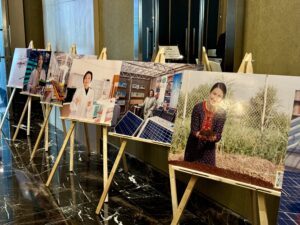ISTANBUL – More than 160 representatives of governments, international organizations, experts, and policymakers gathered in Istanbul on Oct. 17-18 for the second edition of the Istanbul Development Dialogue (IDD) to explore how to integrate gender equality in climate policies and empower women and girls in climate action and a broader green transition.

The forum participants pose for a group photo. Photo credit: Assel Satubaldina/ The Astana Times
The two-day event, titled Investing for Gender Equality and Inclusive Climate Action, is organized by the United Nations Development Programme (UNDP) and the Organization for Economic Co-operation and Development (OECD) in partnership with the government of Türkiye. The aim is to explore the connections between gender equality and inclusive climate strategies while advocating for increased investments in gender equality as a catalyst for advancing climate action.
The event, part of a series of the IDD, also highlights key elements necessary for achieving a just transition and meeting the climate targets and commitments outlined in the UN Framework Convention on Climate Change (UNFCCC), the Paris Agreement, and the Pact for the Future.
Underrecognized role of women
Delivering remarks at the session on Oct. 17, Ivana Živković, Assistant Secretary-General, Assistant Administrator and Director of the UNDP Regional Bureau for Europe and the Commonwealth of Independent States, highlighted the significant yet underrecognized role of women in climate mitigation and adaptation.
“In all countries where we work, we see that women are actively engaged and, in many cases, take the lead in climate change mitigation and adaptation. Women at the grassroots level are leading movements for social justice, environmental activism, human rights, and economic empowerment,” said Živković.
In fact, women are responsible for up to 80% of the world’s food production and bear a disproportionate share of unpaid care work, doing six times as much as men globally.
She also emphasized that where women take leading roles in climate action, the diversity of perspectives leads to more innovative and effective solutions. Data shows that gender-diverse leadership enhances climate outcomes, as companies with 30% of women on board see a 5% reduction in carbon emissions.
Despite such contributions, women earn at least 20% less than men in green jobs, including the energy sector, she added.
In OECD countries, women occupy fewer than one in five senior roles, and only 11% of energy startups are founded by women, compared to nearly 20% in other sectors.
Živković noted that investing in gender equality, particularly in STEM (Science, Technology, Engineering, and Mathematics), fosters innovation and inclusive climate solutions.
“It [investing in gender equality] also helps fill the labor gap of the estimated 14 million jobs needed for clean energy sector growth by 2030, while enhancing women’s economic empowerment by facilitating access to decent and qualified jobs,” she said.

Ivana Živković visited Kazakhstan in June 2023. Photo credit: Assel Satubaldina/ The Astana Times
She went on to emphasize that what is missing is the “interconnected and integrated solutions whereby positive change moves from the ground up and top down, where we strengthen resilience among our most vulnerable communities and empower equality among leadership to ensure that needs are heard and addressed.”
“It requires economies of care and a commitment to enabling women to participate fully in political, economic, and social life and decision-making by lifting the burden of unpaid care work and designing inclusive policies among local and national governments and the private sector,” she said.
Živković outlined that UNDP supports countries in their national adaptation plans and just transition roadmaps, with eight countries already integrating these strategies. “Commitment to gender equality and commitment to taking action on climate change are at the heart of our work in this region,” she added.
Gender equality as a human right
OECD Deputy Secretary-General Ulrik Vestergaard Knudsen emphasized the importance of gender equality as a strategic priority and a human right, crucial for achieving societal and economic objectives, including climate goals.

An exhibition at the event features women in various climate-related sectors. Photo credit: Assel Satubaldina/ The Astana Times
“The OECD Social Institutions and Gender Index (SIGI) shows that women and girls are key agents of change in climate change mitigation and adaptation strategies. Just as an example, enabling women entrepreneurs can actually help us achieve climate goals more quickly. They are, in fact, about 7% more likely than men to report that they prioritize environmental sustainability over economic business goals. We need more of that,” said Knudsen.
While data shows that women’s role in climate action can help accelerate the pace of deployment of climate strategies, firmly rooted barriers are hindering this effort. Knudsen noted that discriminatory social institutions and other barriers, such as lack of access to finance or gender-blind government tools, prevent women from contributing fully and equally to the green transition.
He also highlighted the disparities in gender representation in fields critical to the green transition. Across the OECD, less than 25% of graduates in engineering and fewer than 20% in computing are women.
However, he also emphasized the need to consider the impact of climate policies on men, particularly those employed in high-emission jobs that are being phased out. “Men, in other ways, stand to lose in the transition, as they are often overrepresented in industries we are trying to transition away from,” he said, calling for gender-balanced approaches to policy-making.
Knudsen stressed that integrated perspectives are key to advancing the green transition and supporting all members of society. “We all stand to gain from looking at this through a gender lens,” he added.
Need for gender-responsive policies
Experts agree on the critical need to integrate gender-responsive policies into the just transition, emphasizing the need to address women’s unpaid care work. They call for policies that reduce this burden, ensure equal opportunities, and protect against gender-based violence.
Data indicates that empowering women to fully participate in and benefit from an inclusive transition could contribute over $12 trillion to the global GDP.
A feminist approach to economics is essential for a successful transition, particularly one that acknowledges the impact of caregiving on women’s participation in the workforce. Without a gender perspective, policy tools risk reinforcing existing structural inequalities.
Political appetite to reimagine a different future
Addressing the event, UNDP Global Director for Gender Equality Raquel Lagunas made a compelling case for a more urgent and strategic approach to tackling gender equality and climate action. She noted that while there has been progress in gender equality, it has not been linear.
“War, conflict, climate change, and social and political backlash are putting up a wall of resistance against gender equality,” said Lagunas.
Despite these challenges, 80% of people globally, including in major greenhouse gas-emitting nations, want their governments to take stronger climate action, said Lagunas, referencing a recent UNDP survey. She added that women, more than men, are particularly concerned about climate change and less satisfied with their country’s efforts.
“The fact that we are here means that there is a political appetite to reimagine the future differently, a greener future,” she added.
She outlined actionable steps, emphasizing that despite the challenges, there is no need to fall into pessimism. They include state readiness and government capacity to invest in reforming institutions and policies, integration of care systems across climate action, and access to financing.
Lagunas believes financing is not about the availability of resources but rather how they are distributed. According to her, in 2021, green finance exceeded $730 billion. According to OECD data, only 31% of total climate aid is gender-responsive.
She stressed the difficulties women face in accessing green finance, particularly through commercial banks and investment channels that are not well-suited for small businesses.
“Many women lack access to credit reports, collateral, and even legal addresses,” she added.
Beyond that, Lagunas called for deeper consideration of social norms, pointing out that 90% of the world’s population holds at least one bias against women. Referring to the UNDP Gender Social Norms Index, she indicated that 49% believe that men are better political leaders, and 39% think that in terms of crisis, men should be the ones getting the jobs.
“Unless we take into account that this is the mindset, we will not succeed,” she added.
